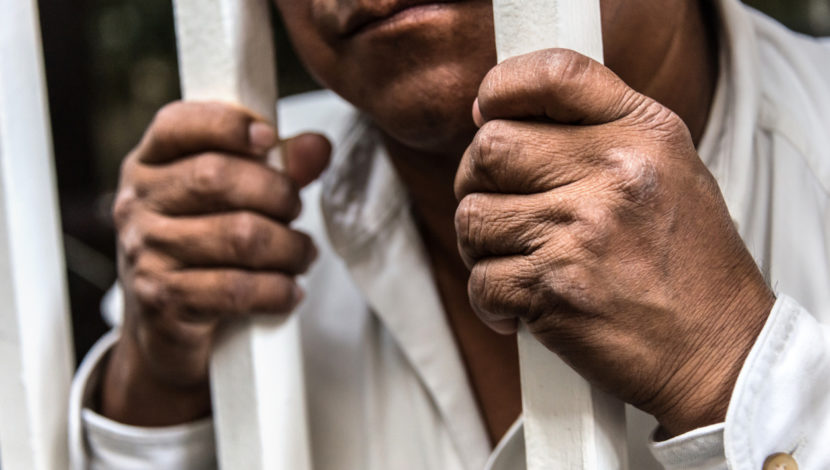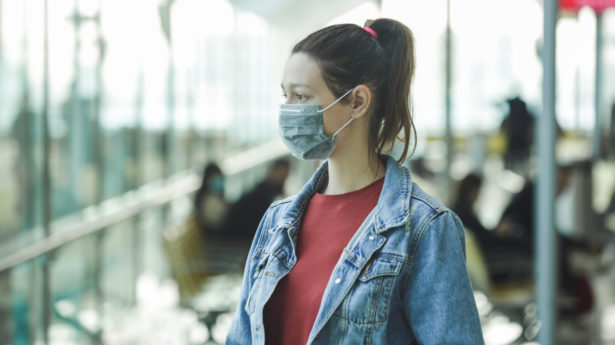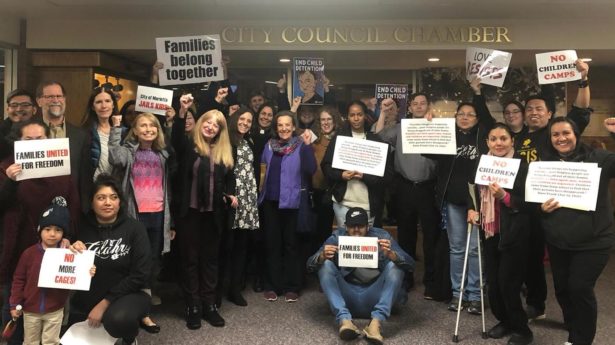The Unitarian Universalist Service Committee advances human rights through grassroots collaborations.
5 Ways to Liberate People in Prison and Detention from Exposure to COVID-19

By on March 19, 2020
The United States has 2.3 million people in prison – the most in the world.
There are 38,000 immigrants and asylum-seekers in ICE detention.
Nearly all of them are forced to live in day-to-day conditions that are a perfect storm for the spread of COVID-19, and their access to medical care is already notoriously inadequate. It is a matter of when – not if – coronavirus will reach people who are incarcerated.
We are in unprecedented times, and unprecedented actions are not only needed, they are truly possible. One county in Ohio released 200 people from jail. In Los Angeles County, CA, new protocols for the sheriff’s department have reduced daily arrests from 300 to 60.
Below are resources to help make it easy to replicate some of the amazing and innovative campaigns underway to organize for the mass release of people from detention and prison, especially those that are at highest risk such as the elderly and immunocompromised.
- Fight locally for the Prison Policy Initiative’s “5 Point Platform”:
- Release medically fragile and older adults.
- Stop charging medical co-pays in prison.
- Lower jail admissions to reduce “jail churn.” (Reduce more non-violent offenses to “non-jailable” so fewer people are moving through local jails)
- Reduce unnecessary parole and probation meetings.
- Eliminate parole and probation revocations for technical violations.
PPI is tracking places where these changes are occurring here.
The Justice Collaborative has created sample letters you can quickly adapt to your local context to target your Governor, Prosecutors, Sheriffs, and County Commissioners and City Council Members. Choose a target based on who seems most moveable and likely to act, do an online search for their e-mail and phone numbers to compile their best contact info, and start mobilizing.
- Call on your governor to help “flatten the curve” by using their emergency powers to release people from immigration detention and prisons, end all pre-trial detention, and stop the flow of unnecessary new arrests for non-violent offenses. Almost every state in the U.S. has declared a “state of emergency” which grants executive power to Governors to take quick and definitive actions. Here is a sample letter from the Building Up People Not Prisons Coalition to Governor Charlie Baker of Massachusetts.
- Most prisons and detention centers have suspended all in-person visitation. Advocate for free phone and video calls to prevent isolation and depression. Here is a sample letter to sheriffs and wardens to advocate for free phone & video calls, which you can also adapt into a “call script” and organize people to make phone calls to the sheriff’s or warden’s office. Freedom for Immigrants is organizing in support of free phone and video visitation in ICE detention facilities. You can also organize calls to your closest ICE ERO field office (directory here) to make these demands.
- Advocate for your local ICE ERO field office to stop in-person check-ins (and call for releases from detention). Organize calls to your closest ICE ERO field office (directory here) and demand that they stop in-person check-ins which expose everyone to unnecessary risk. Use the Freedom for Immigrants Detention Map to identify what facilities detain immigrants that are under their jurisdiction and call for releases from those specific immigration prisons by name.
Sample call script: “Hello, my name is __________, I live in [city/state], and I am calling on ICE to take immediate actions to ‘flatten the curve’ of COVID-19 and not put more people at risk. Please announce a stop to all in-person ICE and ankle-monitor check-ins immediately. Please release all people from immigration detention in [list of facilities covered by their office]. Please do not issue notices of removal for any missed immigration court hearings or missed check-ins. Please provide increased, unrestricted, frequent access to hygiene including soap, showers, sanitizing wipes, clean water and testing and treatment for COVID-19 to all in immigration custody, at no cost to incarcerated people or their families.”
- Join your local immigrant accompaniment network and support your local bail and bond funds. (If you are already involved, check out these resources on COVID-19 for immigrant accompaniment networks.) Accompaniment networks are regularly in touch with people inside immigration detention, and have volunteer systems set up for things like letter-writing that can be done from home. If you are not in a location with an organized accompaniment network, you can still volunteer to be a pen-pal with someone in immigration detention through these organizations or write to people who are LGBTQ in prison. Bail and bond funds are working on overdrive right now to free people from detention centers and prisons whose only barrier is money. Donate to and organize support for your local bail (criminal system) and/or bond (immigration system) fund.
Things to Consider Before You Begin – Ask These Questions
- Is there already an active campaign in your area?
- To find detailed information on specific cities’ and states’ policies and campaigns, go to the Justice Collaborative’s tracking spreadsheet.
- Check the social media pages of local grassroots groups focused on immigrant rights, racial justice, police accountability, and mass incarceration.
- If you identify as an ally, make sure you first and foremost flank efforts led by directly-impacted community members.
- Who else should you be working with locally? Are these relationships you already have, or new relationships?
- What needs are likely to come up if people are released in large numbers? For example, people released from immigrant detention are often left at Greyhound stations. Not everyone released from prison has stable housing to go to. What steps can we take to create more of a safety net and address the issues that will come up at that stage? What other groups in your area are already working on access to housing and harm reduction for people who need a safe place to go?
Photo Credit: iStock – Juanmonino
***
About UUSC: Guided by the belief that all people have inherent worth and dignity, UUSC advances human rights globally by partnering with affected communities who are confronting injustice, mobilizing to challenge oppressive systems, and inspiring and sustaining spiritually grounded activism for justice. We invite you to join us in this journey toward realizing a better future!

